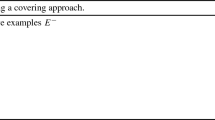Abstract
Semantic query optimisation is the process by which a user query is transformed into a set of alternative queries each of which returns the same answer as the original. The most efficient of these alternatives is then selected, for execution, using standard cost estimation techniques. The query transformation process is based on the use of semantic knowledge in the form of rules which are generated either during the query process itself or are constructed according to defined heuristics. Previous research has tended to focus on constructing rules applicable to single relations and does not take advantage of the additional semantic knowledge, inherent in most databases, associated with relational joins. Our paper seeks to address this weakness by showing how the rule derivation process may be extended to the generation of inter-relational rules using an approach based on inductive learning.
Access this chapter
Tax calculation will be finalised at checkout
Purchases are for personal use only
Preview
Unable to display preview. Download preview PDF.
Similar content being viewed by others
References
M.W. Blasgen and K.P. Eswaran. ‘Storage and access in relational databases’, IBM Systems Journal, 16(4), 363–377, 1977.
Y. Cai, N. Cerone and J. Han, ‘Learning in relational databases: an attribute-oriented approach’, J. Computational Intelligence, 7(3), 119–132, 1991.
A.F. Cardenas. ‘Analysis and performance of inverted data base structures’ Communications of the ACM, 18(5), 253–263, 1975.
S. Chakravarthy, J. Grant and J. Minker, ‘Logic-based approach to semantic query optimisation’, ACM on Database Systems, 15(2), 162–207, 1990.
S. Chaudhuri, ‘An overview of query optimization in relational systems’, PODS, 1998.
Q. Cheng et al., ‘Implementation of two semantic query optimisation techniques in DB2 universal database’, Proc. 25th VLDB, Edinburgh, Scotland, September, 1999.
P. Godfrey et al., ‘Semantic query optimization for bottom-up evaluation’, Proc. 9th International Symposium on Methodologies for Intelligent Systems, Poland, June, 1996.
G. Graefe and D. Dewitt, ‘The EXODUS optimiser generator’, Proc. ACM-SIGMOD Conf. on Management of Data, 160–171, May 1987.
J. Grant et al., ‘Logic based query optimization for object databases’, IEEE Transactions on Knowledge and Data Engineering, Vol. 12, No 4, August 2000.
J. Han, Y. Cai and N. Cercone, ‘Data-driven discovery of quantitative rules in relational databases’, IEEE on Knowledge and Data Eng., 5(1), 29–40, 1993.
D. Haussler, ‘Quantifying inductive bias: AI learning algorithms and Valiant’s learning framework’, J. Artificial Intelligence, 36, 177–221, 1988.
J. King, QUIST: ‘A system for semantic query optimisation in relational databases’, Proc. 7th VLDB Conf., 1981.
B.G.T. Lowden, J. Robinson and K.Y. Lim, ‘A semantic query optimiser using automatic rule derivation’, Proc. Fifth Annual Workshop on Information Technologies and Systems, Netherlands, 68–76, December 1995.
B.G.T. Lowden and J. Robinson, ‘A statistical approach to rule selection in semantic query optimisation’. Proc. 11th International Symposium on Methodologies for Intelligent Systems, LNCS, 330–339, Warsaw, June 1999.
B.G.T. Lowden and J. Robinson, ‘Improved information retrieval using semantic transformation’, CSM 355, University of Essex, 2002.
L. F. Mackert and G. M. Lohman, ‘R* optimizer validation and performance evaluation for local queries’, ACM-SIGMOD, 84–95, 1986.
G. Piatetsky-Shapiro and C. Matheus, ‘Measuring data dependencies in large databases’, Knowledge Discovery in Databases Workshop, 162–173, 1993.
J. Robinson and B.G.T. Lowden, ‘Data analysis for query processing’, Proc. 2nd International Symposium on Intelligent Data Analysis, London, 1997.
J. Robinson and B.G.T. Lowden, ‘Semantic optimisation and rule graphs’, Proc. 5th KRDB Workshop, Seattle, WA, May 1998.
J. Robinson and B.G.T. Lowden, ‘Distributing the derivation and maintenance of subset descriptor rules’, Proc. 7th International Conference on Information Systems and Synthesis, Orlando USA, July 2001.
I. Savnik and P.A. Flach, ‘Bottom-up induction of functional dependencies from relations’, Proc. Knowledge Discovery in Databases Workshop, 174–185, 1993.
A. Sayli and B.G.T. Lowden, ‘Ensuring rule consistency in the presence of DB updates’, Proc. XII International Symposium on Computer & Information Sciences, Turkey, October 1997.
S. Shekhar, B. Hamidzadeh and A. Kohli. ‘Learning transformation rules for semantic query optimisation: a data-driven approach’, IEEE, 949–964, 1993.
S.T. Shenoy and Z.M. Ozsoyoglu, ‘Design and implementation of semantic query optimiser’, IEEE Transactions on Knowledge and Data Eng., 1(3), 344–361, 1989.
M. Siegel, E. Sciore and S. Salveter, ‘A method for automatic rule derivation to support semantic query optimisation’, ACM on Database Sys., 17(4), 563–600, 1992.
Yu C. and Sun W., ‘Automatic knowledge acquisition and maintenance for semantic query optimisation’, IEEE Transactions on Knowledge and Data Engineering, Vol. 1, No. 3, 362–375, 1989.
W. Ziarko, ‘The discovery, analysis and representation of data dependencies in databases’, Knowledge Discovery in Databases, AAAI Press, 195–209, 1991.
Author information
Authors and Affiliations
Editor information
Editors and Affiliations
Rights and permissions
Copyright information
© 2002 Springer-Verleg Berlin Hidenberg
About this paper
Cite this paper
Lowden, B.G., Robinson, J. (2002). Constructing Inter-relational Rules for Semantic Query Optimisation. In: Hameurlain, A., Cicchetti, R., Traunmüller, R. (eds) Database and Expert Systems Applications. DEXA 2002. Lecture Notes in Computer Science, vol 2453. Springer, Berlin, Heidelberg. https://doi.org/10.1007/3-540-46146-9_58
Download citation
DOI: https://doi.org/10.1007/3-540-46146-9_58
Published:
Publisher Name: Springer, Berlin, Heidelberg
Print ISBN: 978-3-540-44126-7
Online ISBN: 978-3-540-46146-3
eBook Packages: Springer Book Archive




